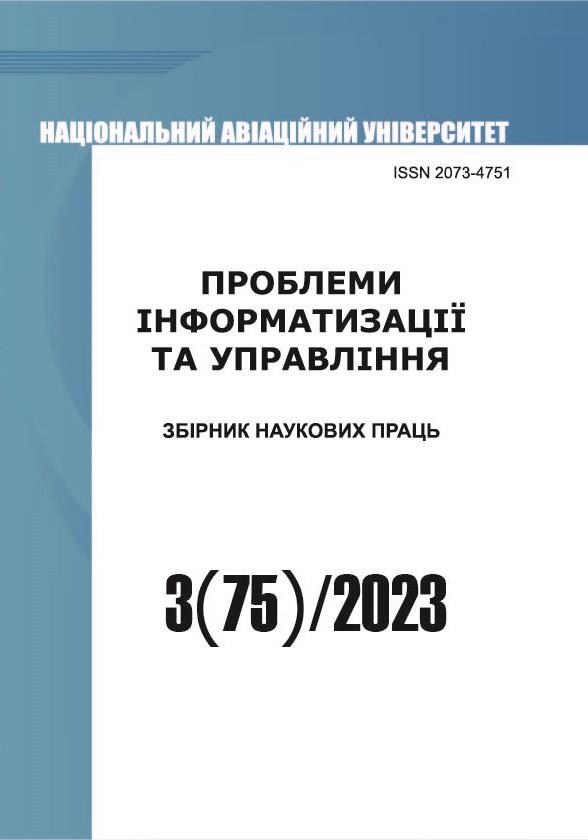Research of predictive control procedures for communication, navigation and surveillance equipment
DOI:
https://doi.org/10.18372/2073-4751.75.18015Keywords:
operation system, predictive control, veracity, communication, navigation and surveillance equipmentAbstract
Communication, navigation and surveillance devices play a significant role in the process of ensuring the safety of civil aviation flights. Operation systems are used to maintain the reliability and efficiency of the intended use of this equipment. The operation system includes the devices of communication, navigation and surveillance, personnel, documentation, and resource support. The main functions of the operation system are: organization, coordination, control of the technical operation of objects and devices of communication, navigation and surveillance; carrying out organizational and technical measures regarding modernization, support of operational readiness and extension of the service life of these equipment; planning, organization, coordination and control of operation on the certification of aviation devices and services; planning, coordination and control of flight inspections of vehicles; improvement and implementation of new methods of operation organization, including based on the use of modern information technologies. Forecasting the technical condition is an important operation process. As a result of forecasting the technical condition of communication, navigation and surveillance equipment, the value of a set of determining parameters is assessed. The practical application of predictive control algorithms involves the reduction of errors in decision-making about the state of the object in the presence of a priori uncertainty. The quantitative measure of the objectivity of decisions made as a result of forecasting is the veracity of forecasting control. The veracity generally characterizes the degree of confidence in decisions made as a result of forecasting. The veracity of the control depends not only on the objectivity of the actual forecasting, but also on the efficiency of the operation of communication, navigation and surveillance systems. This article is devoted to the study of issues related to the features of the application of predictive control and assessment of the veracity of decision-making as a result of forecasting. At the same time, mathematical equations characterizing the process of classifying the technical condition during forecasting and subsequent assessment of the veracity of decision-making are given. The results of the research can be used during the development and modernization of the operation systems for communication, navigation and surveillance equipment.
References
Зуєв О.В. Ситуативний аналіз прийняття рішень та реалізації керуючих впливів в процесах технічного обслуговування радіотехнічних систем. Вісник Державного ун-ту інформаційно-комунікаційних технологій. 2009. Т. 7. № 2. С. 183–187.
Zuiev O.V. Questions of Communication, Navigation and Surveillance Modern Means Exploitation Systems Improvement. Proceedings of the IEEE First International Scientific-Practical Conference on Infocommunications Science and Technology. P.99–101.
Zuiev O.V. Questions of Communication, Navigation and Surveillance Systems Adaptive Operation. Proceedings of the IEEE Second International Scientific-Practical Conference on Infocommunications Science and Technology. P.99–103.
Zuiev O.V., Demydko V.G., Gerasymenko T.S. Analysis of Control Procecces Influence on UAV Equipment Classification Veracity. Proceedings of the IEEE International Conference on Actual Problems of UAV Development. P.102–105.
Solomentsev O., Zaliskyi M., Zuiev O. Estimation of quality parameters in the radio flight support operational system. Aviation. 2016. Vol. 20, Iss. 3. P. 123–128.
Zuiev O.V. Problems of Radio Navigation Systems Adaptive Operation. Proceedings of the 2016 IEEE International Conference on Methods and Systems of Navigation and Motion Control. P.193–198.
Zuiev O.V. Ground Radio Navigation Systems Maintenance Processes Improvement. Electronics and Control Systems. № 4(50). 2016. P.78–83.
Zuiev O.V. Instrument Landing Systems’ Control Processes Investigation. Proceedings of Signal Processing Symposium 2017 (SPS 2017). P.1–4.
Zuiev O, Solomentsev O., Zaliskyi M. Intelligence-Based Operation of Aviation Radioelectronic Equipment. Handbook of Research on Artificial Intelligence Applications in the Aviation and Aerospace Industries: Chapter in the book, IGI Global, Pennsylvania, USA, 2020. P. 148–179.
Zuiev O., Solomentsev O., Petrova, Y. Multiple-choice Classification of Radio Navigation Systems Technical State. Proceedings of 2020 IEEE International Conference on Advanced Computer Information Technologies. P. 246–249.
Rausand M. System Reliability Theory: Models, Statistical Methods and Applications. New York: Wiley, Inc., 2004. 458 p.
Nakagawa T. Maintenance theory of reliability. London: Springer-Verlag, 2005. 270 p.
Tartakovsky A., Nikiforov I., Basseville M. Sequential analysis. Hypothesis testing and changepoint detection. Boca Raton: Taylor & Francis Group, 2015. 580 p.
Ulansky V., Terentyeva I. Availability assessment of a telecommunications system with permanent and intermittent faults. Proceedings of 2017 IEEE Conference on Electrical and Computer Engineering (UKRCON). P. 908–911.
Dhillon B.S. Maintainability, Maintenance, and Reliability for Engineers. New York, Taylor & Francis Group, 2006, 214 p.
Smith D.J. Reliability, Maintainability and Risk. Practical Methods for Engineers. 10th edition, London, Elsevier, 2021, 516 p.
Stark J. Product Lifecycle Management, Volume 1: 21st Century Paradigm for Product Realisation. Third Edition. London, Springer, 2019, 1032 p.
Jardine A. K. S., Tsang A. H. C. Maintenance, Replacement, and Reliability: Theory and Applications. Second Edition. Boca Raton: CRC Press, 2017,364 p.
Ren H., Chen X., Chen Y. Reliability Based Aircraft Maintenance Optimization and Applications. Academic Press, 2017, 260 p.
Downloads
Published
Issue
Section
License
Автори, які публікуються у цьому журналі, погоджуються з наступними умовами:- Автори залишають за собою право на авторство своєї роботи та передають журналу право першої публікації цієї роботи на умовах ліцензії Creative Commons Attribution License, котра дозволяє іншим особам вільно розповсюджувати опубліковану роботу з обов'язковим посиланням на авторів оригінальної роботи та першу публікацію роботи у цьому журналі.
- Автори мають право укладати самостійні додаткові угоди щодо неексклюзивного розповсюдження роботи у тому вигляді, в якому вона була опублікована цим журналом (наприклад, розміщувати роботу в електронному сховищі установи або публікувати у складі монографії), за умови збереження посилання на першу публікацію роботи у цьому журналі.
- Політика журналу дозволяє і заохочує розміщення авторами в мережі Інтернет (наприклад, у сховищах установ або на особистих веб-сайтах) рукопису роботи, як до подання цього рукопису до редакції, так і під час його редакційного опрацювання, оскільки це сприяє виникненню продуктивної наукової дискусії та позитивно позначається на оперативності та динаміці цитування опублікованої роботи (див. The Effect of Open Access).


